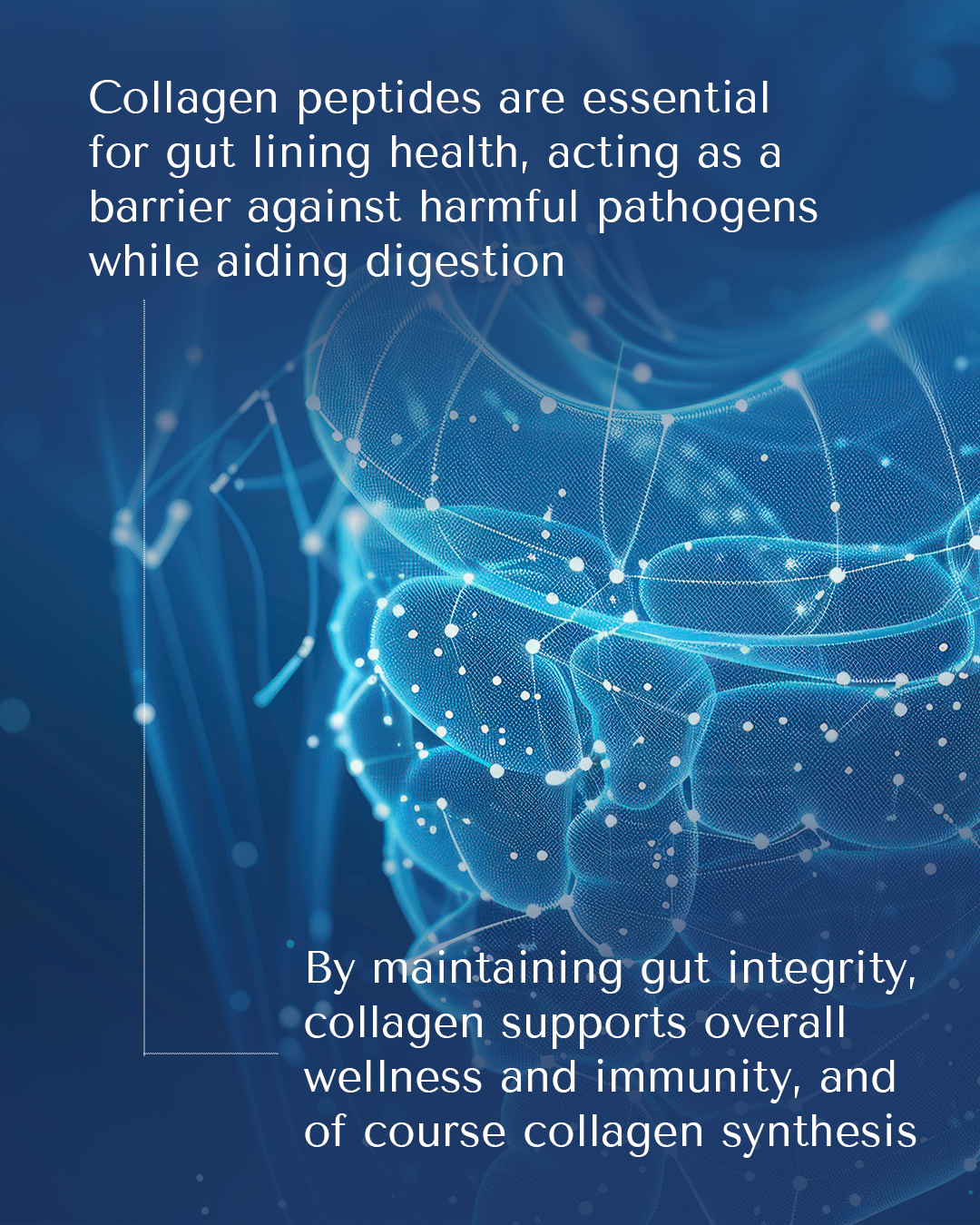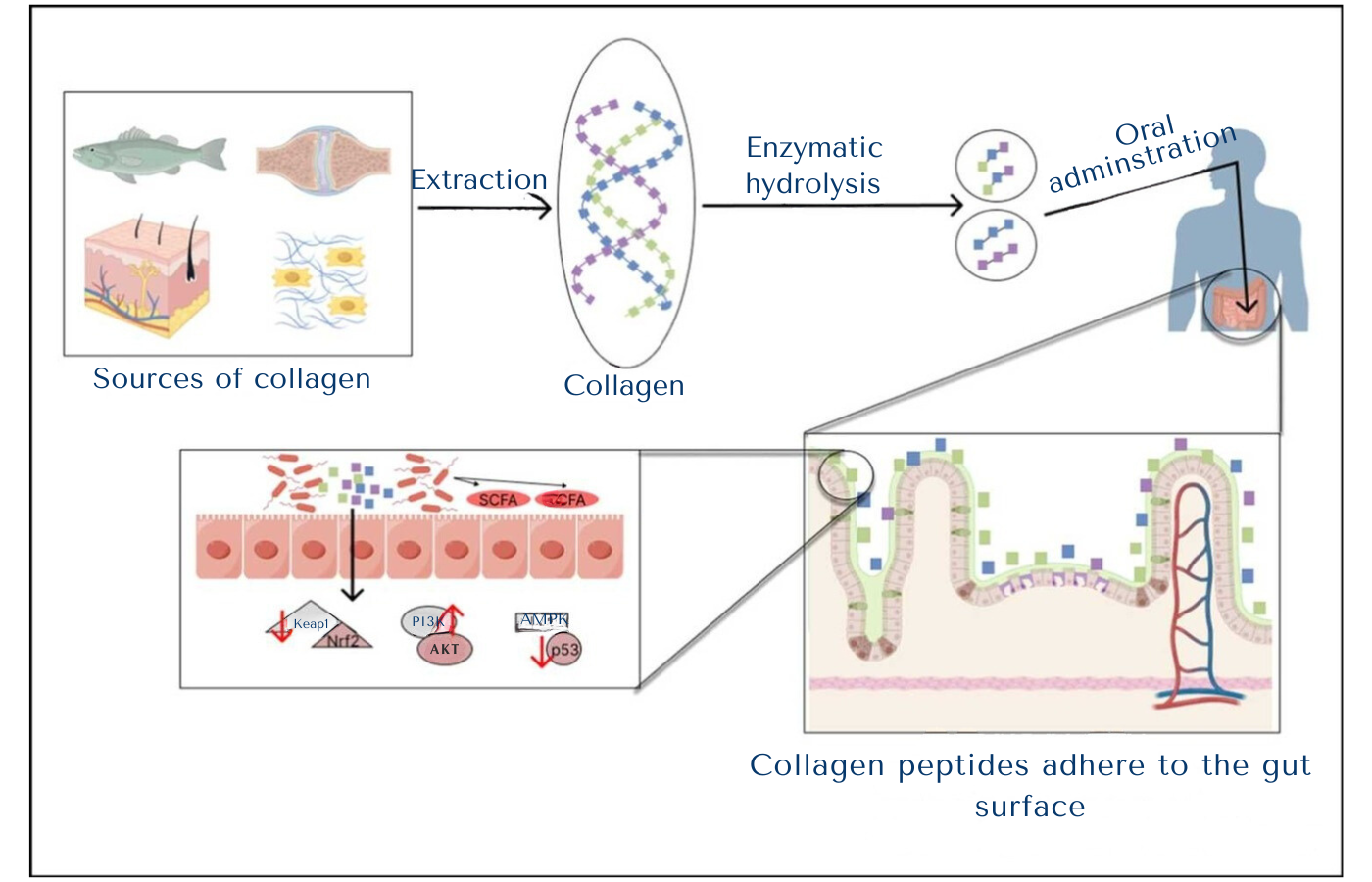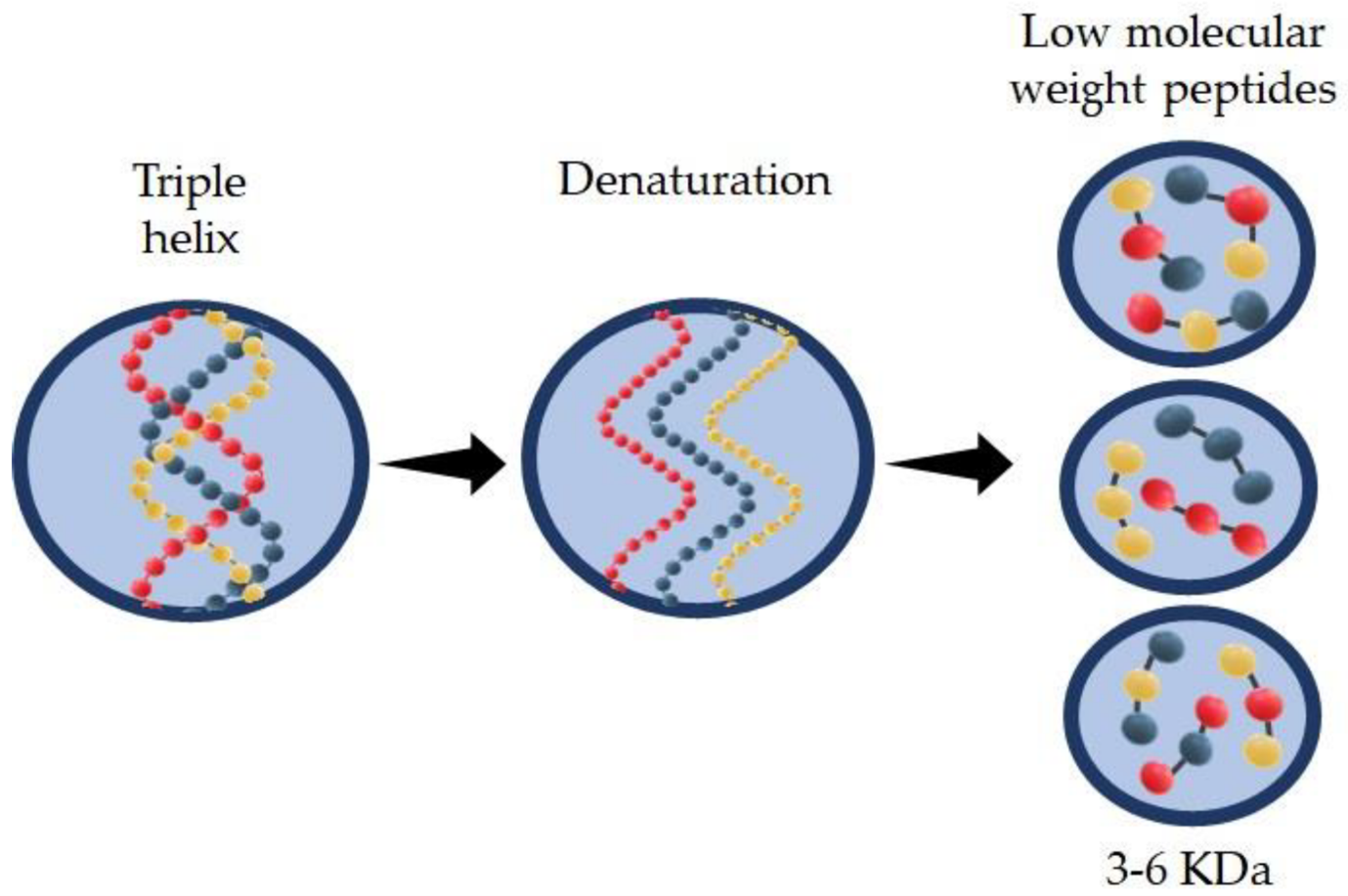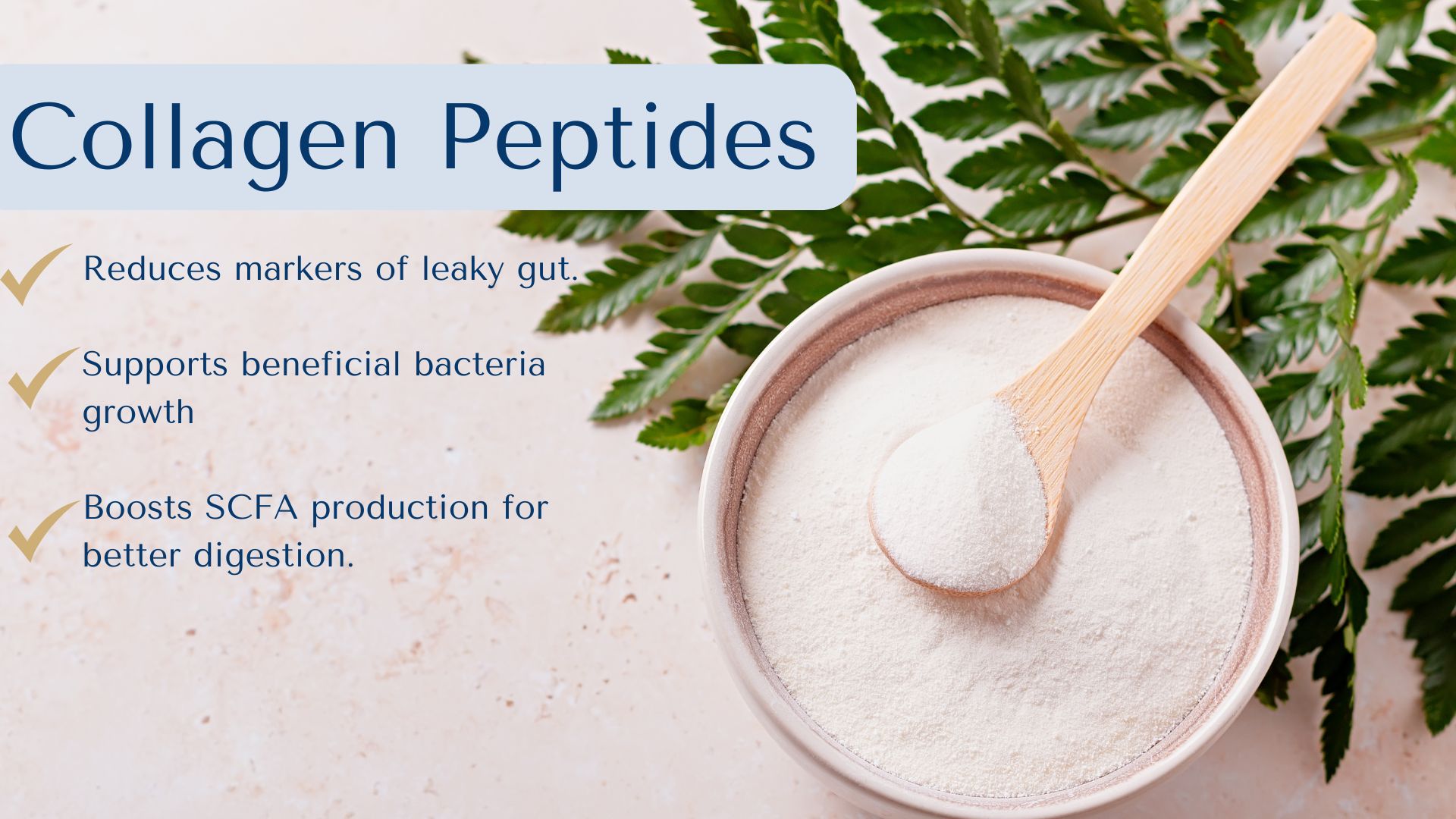
Gut Feelings: Exploring the Gut-Brain Axis and Its Impact on Mental Health
The Gut-Brain Axis Explained The gut-brain axis is a

Collagen is a protein that acts as a key building block for our bodies, providing structure and support to various tissues, including skin, bones, and the gut lining. In the gastrointestinal tract, collagen is particularly important for maintaining the integrity of the intestinal barrier. This barrier is crucial for preventing harmful substances from leaking into the bloodstream, a condition known as leaky gut syndrome. Collagen supports the structural framework of the gut’s mucosal barrier, thereby playing a significant role in digestive health. Among the various types of collagen, Type III collagen is especially relevant for gut function. It is the second most abundant collagen in the body and is predominantly found in the lamina propria of the intestinal lining. This layer of loose connective tissue underpins the gut’s mucosal barrier, providing not only structural support but also facilitating blood flow and contributing to the immune system’s functionality within the gut.
For more comprehensive nutritional information for a healthy microbiome and gut lining read our article The Gut Microbiome, Aging, and Longevity.

As we get older or face various metabolic stressors, our bodies naturally produce less collagen. This decline can hinder the maintenance of healthy connective tissues, leading to a less efficient gut lining. With decreased collagen production, the integrity of the mucosal barrier may weaken, making it more susceptible to conditions such as leaky gut syndrome, characterized by increased intestinal permeability. This can lead to a cascade of health issues, including chronic inflammation and gastrointestinal disorders. Additionally, factors such as poor diet, stress, and environmental toxins can further exacerbate the depletion of collagen.
Collagen supplementation has emerged as a popular strategy to combat the depletion of collagen and its negative impacts on gut health.
Collagen supplementation has been shown to alleviate various digestive symptoms, making it a valuable addition to the diets of those struggling with gastrointestinal issues. The bioactive compounds in collagen, such as glycine and proline, which are specific molecules that have beneficial effects on the body, play a crucial role in promoting the health of the gut lining and enhancing the integrity of the intestinal barrier. By strengthening the intestinal barrier, collagen can help mitigate inflammation and ease discomfort, leading to better overall digestive health. In a peer reviewed study, here, participants who supplemented with collagen reported improved digestive function, including reduced bloating and enhanced regularity, a testament to its beneficial effects on gastrointestinal comfort.
A balanced gut microbiome is essential for overall health, and collagen can play a significant role in maintaining this balance. Collagen supports the growth of beneficial gut bacteria, which are vital for digestion and immune function. By enhancing the gut barrier and creating a supportive environment for the microflora, collagen helps to reduce the dominance of harmful bacteria that can disrupt gut balance. Additionally, maintaining a healthy microbiome has been linked to improved mood and metabolic health, making collagen a multifaceted solution for enhancing both gut health and overall well-being.
Collagen is a vital protein that plays a fundamental role in maintaining the skin’s structure, hydration, and overall texture. As we age, our natural collagen production declines, leading to common issues such as dryness, reduced elasticity, and visible signs of aging. Fortunately, collagen supplementation has emerged as a potential solution to counteract these effects. Research has shown that incorporating collagen peptides into our diet may enhance hydration, improve skin elasticity, and reduce signs of aging, thereby promoting healthier and more radiant skin.
Hydrolyzed collagen, particularly derived from bovine sources, has shown significant benefits when taken as a dietary supplement, particularly for its ability to improve skin elasticity, reduce wrinkles, and enhance dermal matrix synthesis. Collagen peptides are small fragments of collagen that are easily absorbed into the bloodstream and then reach the skin, where they interact with fibroblasts, the cells responsible for collagen production.

Collagen is made up of chains of amino acids—mainly glycine, proline, and hydroxyproline—that form the building blocks for collagen production. When collagen is broken down into peptides during hydrolysis, these smaller peptide fragments, along with free amino acids, are absorbed by the body. The amino acids serve as essential raw materials for collagen synthesis, providing the building blocks for new collagen fibers, while bioactive dipeptides (such as Pro-Hyp) act as activators that stimulate fibroblasts to upregulate the production of collagen.
Collagen plays a vital role in supporting gut integrity by reinforcing the structure of the intestinal lining. It is primarily composed of Type III collagen, which is crucial for maintaining the lamina propria—a layer of connective tissue that provides essential support, blood flow, and immune function within the intestines. As we age, collagen production naturally declines, which can compromise the integrity of the gut lining. By incorporating collagen-rich foods or supplements into your diet, you can help restore and maintain the strength and resilience of your gut lining.
The gut lining, often referred to as the intestinal barrier, plays a critical role in maintaining overall health by acting as a protective barrier between the internal body and the external environment. This specialized lining, composed of tightly packed cells, regulates the passage of nutrients and waste while preventing harmful substances such as toxins, pathogens, and undigested food particles from entering the bloodstream. A healthy gut lining is essential for proper nutrient absorption, immune function, and overall digestive health. When the gut lining becomes compromised—often due to chronic inflammation, poor diet, stress, or antibiotic use—it can lead to conditions like leaky gut syndrome. This condition allows unwanted substances to leak into the bloodstream, triggering inflammation and potentially leading to a variety of health issues, including autoimmune disorders and gastrointestinal problems. Therefore, maintaining the integrity of the gut lining is vital for promoting overall well-being and preventing a range of chronic illnesses.
Preventing leaky gut syndrome is crucial for maintaining overall health, as this condition can lead to inflammation and a host of other health issues. One effective strategy is to incorporate collagen-rich foods or supplements into your diet. Collagen provides essential amino acids, particularly glycine and glutamine, which support the integrity of the gut lining and strengthen the barrier against harmful substances, such as toxins and bacteria. Additionally, a balanced diet rich in fiber, probiotics, and anti-inflammatory foods can promote a healthy gut microbiome, further enhancing gut health. Staying hydrated and managing stress levels are also vital, as both can impact gut function. By taking these proactive steps, you can help preserve the integrity of your gut lining and prevent the onset of leaky gut syndrome.

Hydrolyzed collagen peptides, commonly referred to as collagen peptides derived from collagen, a vital protein found in connective tissues such as skin, bones, and cartilage. These peptides undergo hydrolysis, a process that breaks down collagen into smaller, more easily absorbed molecules, enhancing their bioavailability.
This enhanced bioactivity allows it to signal cells more effectively for collagen synthesis and stimulate repair processes in skin and gastrointestinal tissues.
Bioactive peptides are short chains of amino acids that are generated during the hydrolysis of collagen. They possess unique biological activities that contribute to various physiological functions, including collagen synthesis. Bioactive Peptides like Pro-Hyp, a dipeptide of Proline and Hydroxyproline, can be absorbed intact through the intestinal walls. Once they reach the dermis (the layer of the skin where fibroblasts reside), they bind to receptors on the surface of fibroblast cells in various tissues such as the skin, joints, and bones and promote collagen synthesis, as well as hyaluronic acid synthesis, full details of clinical studies here.
Not all Hydrolysed Collagen have the same Bioactive profiles, this is a function of the hydrolysis process and the raw bovine collagen ingredient, you can read more about Bioactive Peptides here and the Patent hydrolysis process used by our supplier COLLinstant® here.

Though historically, marine collagen was considered more bioavailable and easily absorbed due to its low molecular weight, sophisticated hydrolysis processes can now produce low molecular weight bovine collagen peptides of equal or superior absorption to marine collagen. Many clinical studies have shown rapid absorption of hydrolysed bovine collagen in the digestive tract, passage into the bloodstream as small peptides and accumulation in the skin 96 h after ingestion. After ingestion of hydrolyzed collagen, proline and hydroxyproline were found in the bloodstream.
Bovine collagen is primarily rich in Type I and Type III collagen, which together make up a significant portion of the collagen found in skin, tendons, and bones. Type I collagen, which constitutes about 90% of the collagen in the body, is crucial for maintaining skin elasticity and hydration, thus playing a key role in anti-aging effects. Type III collagen, which is often found alongside Type I, not only supports skin structure and elasticity but also plays a vital role in the formation of blood vessels and tissue repair. This unique property of Type III collagen helps to enhance skin resilience, promoting a youthful appearance and preventing sagging. In contrast, marine collagen lacks significant amounts of Type III collagen, while marine collagen has been noted to effectively support skin hydration and elasticity, it does not provide the same comprehensive benefits as bovine collagen, including support for skin, joint, and gut health, owing to its diverse collagen types.
In COLLinstant® clinical trial they evaluated its effectiveness as a dietary supplement for osteoarthritis symptoms. The study investigated if daily COLLinstant® collagen hydrolysate with vitamin C could reduce pain, lower inflammation, and enhance joint function in patients with moderate to severe grade 2 and 3 osteoarthritis.
You can learn more about Marine vs Bovine Collagen here

A specialized form of collagen created through the slow boiling of animal bones, cartilage, and skin. This careful process breaks down connective tissues to yield a gelling substance that retains many of collagen’s inherent benefits. Although both gelatin and hydrolyzed collagen share similar amino acid profiles vital for various bodily functions, their characteristics differ significantly in terms of absorbability and bioactivity, affecting their best uses.
In contrast to hydrolysed collagen, gelatin has larger peptide structures, which may take longer to digest and absorb. While gelatin still offers health benefits, its absorbability is not as efficient as hydrolyzed collagen. Individuals who consume gelatin may find that they experience benefits, but they may be more gradual compared to those who take hydrolyzed collagen, which can be rapidly assimilated.
Gelatin gelling properties make it useful for culinary applications, allowing it to be incorporated into an array of recipes such as desserts, soups, and sauces.
Collagen-rich food sources are essential for maintaining skin, joint, and overall health. The best sources of collagen include animal-based options such as fish, particularly those with skin like salmon, and various cuts of beef that contain connective tissues, such as brisket and pot roast. Chicken, eggs (especially egg whites), and gelatin are also excellent sources. Bone broth, made by simmering animal bones and connective tissues for extended periods, is renowned for its high collagen content and is often touted for its digestive and healing properties. For those seeking to enhance their collagen intake, incorporating vitamin C-rich foods like tomatoes, citrus fruits, and bell peppers can
aid collagen synthesis, while marine collagen is noted for its superior absorption compared to other types. It’s important to balance these collagen-rich foods with a diet high in fruits and vegetables to support overall health and protect against collagen degradation.
A few clinical studies referenced in the Science Direct delve into the influence of collagen peptides on gut health, particularly focusing on their potential role in enhancing the intestinal barrier and increasing the production of short-chain fatty acids (SCFAs).
Participants in the clinical trials typically received daily doses of collagen peptides, which were often administered in powdered form to be mixed with beverages or food. The dosing varied between studies but usually ranged from 5 to 15 grams per day.
The assessment of gut health in these studies was multi-faceted and involved several key measures:
The results of these studies indicated that participants who consumed collagen peptides demonstrated a significant reduction in markers of intestinal permeability, suggesting that the collagen effectively fortified the gut lining. Improvements in gut microbiota composition were also noted, with an increase in beneficial bacteria correlating with higher SCFA levels. Not only did this contribute to better gut health, but it also led to reported improvements in symptoms related to gastrointestinal distress.
A systematic review of research and clinical studies on hydrolyzed collagen supplements, such as those available in the article on PubMed Central, highlights significant findings regarding their impact on collagen synthesis and overall skin health. The review consolidates various trials; key outcomes indicate that participants who supplemented with hydrolyzed collagen experienced improvements in skin elasticity, hydration, and overall dermal structure, along with a reduction in wrinkle depth. Additionally, the studies suggest enhanced collagen synthesis within the dermis and improved skin barrier function, which may help counteract the effects of aging and environmental stressors.
Overall, hydrolyzed collagen supplementation demonstrates potential benefits not only for enhancing skin radiance but also for promoting healthier connective tissues throughout the body.
Collagen is the most abundant protein in the human body, playing a vital role in maintaining the integrity of our skin, bones, muscles, and connective tissues. As we age, our natural collagen production diminishes, leading to various signs of aging, including sagging skin, wrinkles, brittle bones, and digestive issues. Consequently, collagen supplementation has gained considerable attention, especially concerning its long-term benefits for overall health. The amino acids proline and hydroxyproline in collagen are vital for maintaining the integrity of the gut lining. This suggests that collagen supplementation could be beneficial for individuals suffering from digestive issues, including conditions like leaky gut syndrome. Research has shown that collagen can help repair gut tissues, potentially reducing symptoms like bloating and digestive discomfort. As a result, long-term collagen supplementation may lead to improved gut health, which is essential for overall well-being.

In summary, collagen is more than just a beauty booster; it plays a crucial role in supporting both gut health and skin radiance. As we age, our body’s natural collagen production declines, contributing to various health challenges, including skin aging and digestive issues. However, regular supplementation with high-quality, low molecular weight collagen—specifically those ranging from 3,000 to 5,000 Daltons—can help combat these effects. This type of collagen is more easily absorbed by the body, ensuring maximum benefits for vibrant, youthful skin and a resilient gut lining.
Moreover, it is essential to complement collagen supplementation with vitamins and minerals that support collagen synthesis, whether through a well-balanced diet or fortified supplements. Nutrients such as vitamin C, zinc, and copper are vital for the production and maintenance of collagen in the body. By aiding in the repair of gut tissues and enhancing the production of beneficial short-chain fatty acids, collagen serves as a multifaceted ally that nurtures our overall health.
Embracing collagen, alongside the necessary nutrients for its synthesis, is truly a celebration of holistic health, allowing us to age gracefully while maintaining our vitality.
Guan, L. L., de Bruijn, W. J., Choong, Y. S., & Solis, G. (2019). Fermented Rice Bran and Rice Bran Oil in Traditional Japanese Medicine: Sake as a Potential Functional Beverage. Journal of Ethnopharmacology, 235, 405-418. https://doi.org/10.1016/j.jep.2019.01.007
Lee, D. E., Huh, C. S., & Huh, J. W. (2019). Korean Traditional Use of Fermented Rice Water: A Historical Review and its Modern Applications in Cosmetics. Journal of Cosmetic Science, 70(3), 241-250.
Zhou, J., & Qu, F. (2015). Face Mapping: Chinese Holistic Skin Analysis as an Indicator of Internal Organ Imbalance. International Journal of Dermatology, 54(8), 884-892. https://doi.org/10.1111/ijd.12736
Bowe, W. P., & Logan, A. C. (2011). Acne vulgaris, probiotics and the gut-brain-skin axis – Back to the future? Gut Pathogens, 3(1), 1. https://doi.org/10.1186/1757-4749-3-1
https://www.ncbi.nlm.nih.gov/pmc/articles/PMC10385652
https://www.mdpi.com/1422-0067/24/24/17618
https://journals.plos.org/plosone/article?id=10.1371/journal.pone.0237207

Let us know what you’d like to see on our blog. We’re always open to ideas and would love to hear from you!

The Gut-Brain Axis Explained The gut-brain axis is a

The Science Behind Collagen for Healthy Skin If you’re

What is “Collagen Banking”? Proactive Strategies for Long-Term Skin
Subscribe for Exclusive Insights